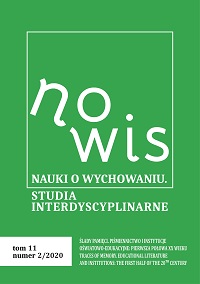The Issue of Popular Education in Selected Socio-Cultural Journals of the Kingdom of Poland in the 1905–1918 Period
DOI:
https://doi.org/10.18778/2450-4491.11.12Keywords:
popular education, popularization of education, educational work, socio-cultural journals, the Kingdom of PolandAbstract
The issue of popular education in the Kingdom of Poland started to arise as early as the period 1858–1860. Analysing the socio-cultural journals of this period one can easily see numerous articles and correspondence calling for society to propagate popular education (establishment of libraries, educating school teachers, propagation of youth associations, education of women etc.). The editors of the analysed journals, as well as the authors writing on the subject, stated that if progress and well-being were to be introduced in the countryside the only way was through development of broad popular educational activity.
References
Belmont L. (1907) Zamknięta Macierz, “Wolne Słowo”, 4: 1–3.
Google Scholar
Biblioteki szkolne, (1907), “Sztandar”, 19: 5–6.
Google Scholar
Biernacka M. (1984) Oświata w rozwoju kulturowym polskiej wsi, Wrocław, Wydawnictwo Polskiej Akademii Nauk.
Google Scholar
Bojarska S. (1917) Dowód mocy ludowej, “Wyzwolenie”, 18: 191–192.
Google Scholar
Bojarska S. (1918) Sami sobie budują lepszą przyszłość (Wieści z ziemi pułtuskiej), “Wyzwolenie”, 1: 4–5.
Google Scholar
Czytelnik W.A. (1917) Szkoła Ludowa im. Tadeusza Kościuszki, “Wyzwolenie”, 46: 442.
Google Scholar
Do czego pijaństwo doprowadzi. Odstraszające przykłady, (1907), “Dzwonek Częstochowski”, 6 (67): 86–90.
Google Scholar
Domy ludowe i uniwersytety powszechne w Anglii, (1907), “Sztandar”, 20: 15–16.
Google Scholar
E. B. (1907) Listy z nad Prosny (Opieka nad dziatwą), “Sztandar”, 16: 7–8.
Google Scholar
Gębarski S. (1907a) O otruciach, “Dzwonek Częstochowski”, 3 (64): 100–104.
Google Scholar
Gębarski S. (1907b) Pomoc doraźna w przypadkach krwotoku, “Dzwonek Częstochowski”, 2 (63): 90–92.
Google Scholar
Głos z Podola (1907) Przez ochronkę do szkoły, przez ochroniarki do nauczycielek, “Sztandar”, 17: 7–8.
Google Scholar
Huzarski J. (1913) O czem się dziś nie mówi: Niewyzyskane siły, “Polemista”, 12: 15–16.
Google Scholar
Instrukcje dla nauczycieli szkół ludowych (1905), “Ogniwo”, 35: 920.
Google Scholar
Kamieński J. (1910) Nasz język, “Odrodzenie”, 25: 377–379.
Google Scholar
Karczewska W. (1917) Na nowy rok szkolny, “Wyzwolenie”, 37: 371–372.
Google Scholar
Kmiecik Z. (1976) Prasa polska w latach 1864–1918, Warszawa, Państwowe Wydawnictwo Naukowe.
Google Scholar
Kozikowski E. (1917a) Uświadamiajmy lud, “Wyzwolenie”, 9: 102.
Google Scholar
Kozikowski E. (1917b) Walka z ciemnotą, “Wyzwolenie”, 6: 66–67.
Google Scholar
Ludowiec (1918) Ciemnota największy nasz wróg, “Wyzwolenie”, 6: 56–57.
Google Scholar
Lutosławski W. (1910) Wpisy szkolne, “Świat”, 6: 3–5.
Google Scholar
Mańkowski J. (1907) Strzeżmy własnej kultury, “Sztandar”, 21: 1–2.
Google Scholar
Nasiłowski A. (1917) Parę słów w sprawie zdrowia ludu, “Wyzwolenie”, 43: 416.
Google Scholar
Niektóre przyczyny pijaństwa (1905), “Dzwonek Częstochowski”, 6 (48): 122–124.
Google Scholar
Perej St. (1907) Seminarium dla nauczycielek ludowych, “Sztandar”, 7: 6–7.
Google Scholar
Ołdakowski M. (1917) W sprawie Kół młodzieży wiejskiej, “Wyzwolenie”, 51: 481.
Google Scholar
Oświata. (Co się w niej robi a jeszcze robić trzeba) (1907), “Sztandar”, 19: 3.
Google Scholar
Owidzki L. (1917) Do szkół, “Wyzwolenie”, 24: 251.
Google Scholar
DOI: https://doi.org/10.2307/2973573
Poznański K. (1964) Opinia publiczna Królestwa Polskiego wobec sprawy oświaty ludu w 1861 roku, “Rozprawy z Dziejów Oświaty”, 7: 70.
Google Scholar
Przeciszewska M. M. (2015) Tygodnik ilustrowany “Oświata” jako narzędzie formowania “cesarskiego chłopa” w Królestwie Polskim w latach 1900–1905, “Rocznik Biblioteki Narodowej”, XLVI: 197–220.
Google Scholar
Przykład do naśladowania (1907) “Wyzwolenie”, 44: 424–425.
Google Scholar
Rolnik (1907) Partyjność a oświata, “Sztandar”, 26: 3–4.
Google Scholar
Siostra z nad Nidy (1917) Pomyśleć o tym, “Wyzwolenie”, 22: 231–232.
Google Scholar
Smoła J. (1917) Do was druhowie i druhnie, “Wyzwolenie”, 49: 465–466.
Google Scholar
Wasz kolega Sokołowiak z pod Łomży (1917) Sokołowiak do sokołowiaków i młodzieży ziemi łomżyńskiej, “Wyzwolenie”, 28: 290–291.
Google Scholar
Wilczkowski K. (1906) Na Kresach (List z Polesia i Wołynia), “Sztandar”, 14: 4.
Google Scholar
Wołoszyn S. (1998) Nauki o wychowaniu w Polsce w XX wieku. Próba syntetycznego zarysu na tle powszechnym, Kielce, Dom Wydawniczy Strzelec.
Google Scholar
Wódka szkodzi zdrowiu i przyśpiesza śmierć, (1905), “Dzwonek Częstochowski”, 3 (45): 105–106.
Google Scholar
Wymowa cyfr (1913), “Wolne Słowo”, 191: 20.
Google Scholar
Zadania szkoły ludowej (1917), “Wyzwolenie”, 19: 199–200.
Google Scholar
Downloads
Published
How to Cite
Issue
Section
License

This work is licensed under a Creative Commons Attribution-NonCommercial-NoDerivatives 4.0 International License.





 The journal's website, created and edited by the NOWiS Editorial Team on the Index Copernicus platform:
The journal's website, created and edited by the NOWiS Editorial Team on the Index Copernicus platform: 





